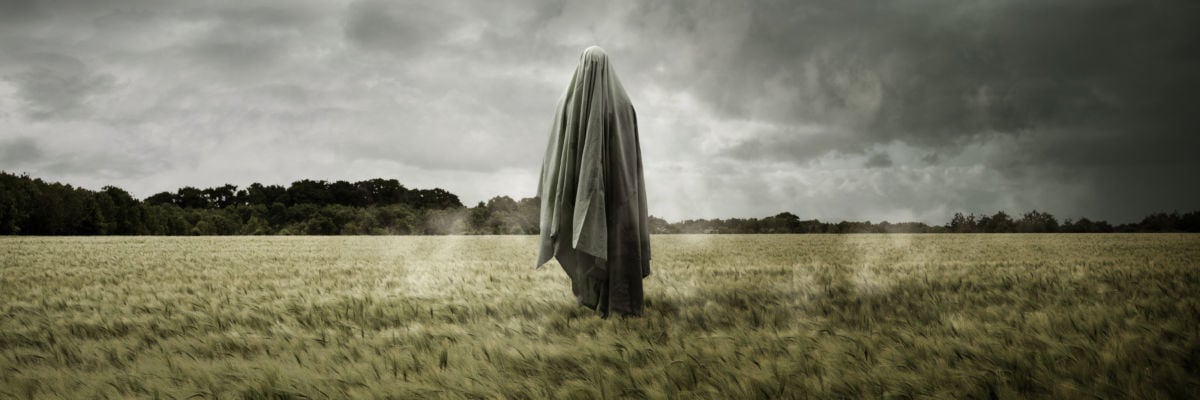
Most Christians I know attribute ghost stories either to natural phenomena or demonic activity. But are these the only two options?
The Church has never definitively settled this question—in fact, some of its greatest theologians have disagreed with one another. But the Church has affirmed numerous apparitions of deceased saints as well as the messages they bring. That gives us something to go on.
Ghost comes from an Old English word related to the German geist, meaning “spirit,” and Christians certainly believe in spirits: God, angels, and the souls of deceased humans all qualify. Many say that the souls of the dead shouldn’t be roaming around among the living, since upon death the immaterial soul separates from the material body until the resurrection (Rev. 20:5, 12-13). But is there good reason to believe that human spirits appear on Earth?
In Sacred Scripture, we read of spirits of humans appearing to the living. For example, the witch at Endor calls up the ghost of the prophet Samuel (1 Sam. 28:3–25). The fact that the witch was shocked by the event suggests that her previous claims of raising spirits were probably false, but Scripture presents this as an actual event without qualification. We are also told that Judas Maccabeus met the ghost of Onias the high priest in a vision (2 Macc. 15:11-17).
In the Gospel of Matthew, the disciples saw Moses and Elijah (who had not yet resurrected) with Jesus on the Mount of Transfiguration (17:1–9). Prior to this, the disciples thought Jesus himself was a ghost (14:26), indicating that they at least had an idea of ghosts. Appearing after his resurrection, rather than correct the idea of ghosts, Jesus simply says he isn’t one (Luke 24:37-39).
Scripture, then, gives us clear examples of spirits manifesting immaterially on Earth and doesn’t record Jesus debunking the idea when he had a chance to. The issue, then, seems to be not one of possibility, but of likelihood.
Some Church Fathers rejected the existence of ghosts, and some explained the Samuel incident as demonic activity. St. Augustine attributed most ghost stories to angelic visions, but his concern seems to have been more about fighting pagan beliefs than considering metaphysical possibilities. Indeed, he allowed that God could in some cases bring spirits back to visit and admitted that “if we state that these things are false, we shall seem indifferently to go against the writings of certain of the faithful and against the senses of those who affirm that such things have happened to them.”
St. Thomas Aquinas disagreed with Augustine on the question of ghosts, concluding in the supplement to the third part of the Summa that “it is absurd to say that the souls of the departed do not leave their abode.” Claiming that Augustine was “speaking according to the common course of nature” in denying the possibility of ghosts, Aquinas asserted that
according to the disposition of divine providence, separated souls sometimes come forth from their abode and appear to men. . . . It is also credible that this may occur sometimes to the damned, and that for man’s instruction and intimidation they be permitted to appear to the living.
Further, he said, souls “are able to appear wondrously to the living when they will.”
Not only did Aquinas believe in the possibility of ghosts, but he seems to have encountered them himself. On two recorded occasions, deceased souls visited the Angelic Doctor: Brother Romanus (who Aquinas did not realize had died yet!), and Aquinas’s deceased sister.
But if souls can appear at will, why don’t they do it all the time? This was part of Augustine’s reasoning against the possibility. Aquinas answers, “Although the dead be able to appear to the living as they will . . . they are either wholly conformed to the divine will, so that they may do nothing but what they see to be agreeable with the divine disposition, or else they are so overwhelmed by their punishments that their grief for their unhappiness surpasses their desire to appear to others.”
The possibility of visits from deceased souls does not, of course, explain every spiritual encounter. Although demonic activity in Scripture is mediated through living, physical beings (even animals), there is nothing in Scripture or Tradition that would limit them to these kinds of activities. Angels have appeared to, and interacted with, physical objects and people, and demons are fallen angels. Catholics who deal with the paranormal typically say violent or evil hauntings may very well be demonic in nature.
So, although it’s wrong and unbiblical to assume that all ghost-like manifestations are demonic in origin, it’s also unwise to assume that none of them is!
That said, if a ghost is simply understood to be a deceased human’s spirit that appears on Earth, either by its own power or according to some special divine purpose, we cannot simply write off ghost stories as delusions or demonic.
We therefore need to be careful not to judge too swiftly. Such experiences could be from God, angels of all kinds, or deceased spirits—and our reactions to these should differ widely. God alone is due worship; good angels should be given reverence (Rev. 22:8-9) and bad angels a wide berth. As for deceased spirits: although the Church affirms proper veneration of and prayer with the saints, along with Scripture it forbids divination or necromancy—summoning the dead or other practices meant to seek forbidden knowledge (e.g., Deut. 18:11; Lev. 19:31, 20:6, 27; CCC 2116).
If you see a ghost, then, the best thing to do is probably the same thing we do to (and for) the deceased souls—our fellow Christians on the other side of the veil—that we don’t see: pray.



